J. David Core's Blog, page 14
January 10, 2016
Author Interview: Brady Koch, Author of Gods, Guns & Money
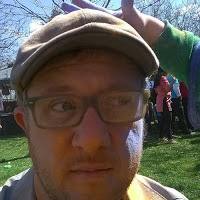 Brady Koch lives in Westchester County, NY with his wife and children. Feel free to read over Brady's shoulder if you see him working on a new novel or short story at the coffee shop, library, or commuter train into NYC. Despite his penchant for crime, horror, and the unusual in his writing, he's actually a nice guy and welcomes your feedback. Brady Koch's first collection of short works, Guns, Gods & Robots, is now available.
Brady Koch lives in Westchester County, NY with his wife and children. Feel free to read over Brady's shoulder if you see him working on a new novel or short story at the coffee shop, library, or commuter train into NYC. Despite his penchant for crime, horror, and the unusual in his writing, he's actually a nice guy and welcomes your feedback. Brady Koch's first collection of short works, Guns, Gods & Robots, is now available. Here is a synopsis of Guns, Gods & Robots
Guns: A girl’s birthday wish comes true when she gets to spend an afternoon on manhunt with her lawman father. Gods: An old man discovers his crops aren't the only dead things on his farm. Robots: A heartless machine built for compassion malfunctions, leading its engineer on a hunt to fix the corruption before it spreads. In Guns, Gods & Robots, Brady Koch, mixes and remixes three themes across this collection of stories and novellas that spans the range of science fiction and horror. The stories, collected here for the first time, range from the uplifting to the horrifying. Sure to spark your imagination, the seven stories in Guns, Gods & Robots will also keep you up at night.
Who are your influences?I suppose I’m a populist, but I grew up on Stephen King, then Kurt Vonnegut. I was always pleasantly surprised when an assigned book in school ended up being a great read. Animal Farm and The Illustrated Man stand out for me in those regards.
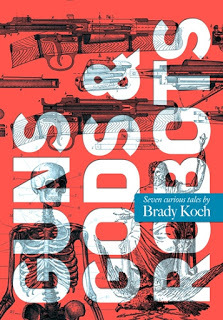 I hold a special place in my heart for Edward Packard, the creator of Choose Your Own Adventure. He also worked on a series of 8 books called Escape that had the same premise, but only one ending to try to get through. I used to pour over those books on the bus, at home, in school when the teacher wasn’t looking and more. I would love to write a choose your own adventure for adults at one point if I can figure out the e-reader linking needed to pull that off.
I hold a special place in my heart for Edward Packard, the creator of Choose Your Own Adventure. He also worked on a series of 8 books called Escape that had the same premise, but only one ending to try to get through. I used to pour over those books on the bus, at home, in school when the teacher wasn’t looking and more. I would love to write a choose your own adventure for adults at one point if I can figure out the e-reader linking needed to pull that off.When did you begin writing?I’ve written off and on through my life. Never much beyond what was required for school. Four years ago, I was faced with a long train commute when I worked in Illinois, so I attempted to start writing again to fill the time. Now it’s my preferred way to spend what quiet time I can find.
How do you come up with your stories, characters, character names, POV, etc?For stories, I tend to simply let my mind wander. Once I figure out the loose scenario I try to find the most condense way to tell the story. My readers know how I prefer to keep things direct, pulpy and lean. Often times my final cuts are much shorter than the first drafts.Most character names are just ones that I’ve latched on to through the years. In Guns, Gods & Robots you’ll come across names from Final Fantasy, podcast hosts, college professors and more. I’m always a fan of naming characters “Walter” after the host at a burger joint I frequented as a kid.
Do you work from an outline?I always start with some bullet points and essentially start filling in each section from there. If there a part of the story I really have a strong vision for, I’ll start writing that instead of the actual beginning of the book. In answering this question, I revisited the original outline for “Numbers 16:32” to compare it to the final draft. It’s mainly still there save for a large phone call section that ended up just being a stalling tactic to get to the resolution of the story.The hardest stories I write are the ones I don’t plan out from the beginning.
Tell me about your favorite scene in your novel.There’s a scene in the story Sangrimal where a young girl gets separated from her dad, the Sheriff, while they’re on a man hunt. She ends up quietly exploring a place called the stump yards and then managing what she finds there. It’s my favorite because it’s the scene I wrote out first and no matter how much the whole story was edited and reframed and gutted, that sequence remained the same. I think it’s the heart of the story and in some ways the whole collection.
Can you tell us a little about your writing philosophy?Get to the point, avoid flowery language and finish the story before you get bored writing it and your readers want to move on to the next book.
Have you ever tried writing in any other genres?The book itself lightly covers other genres from drama, horror and I hope comedy. I’ve always wanted to write some nonfiction, but don’t feel like I have the free time to research any topic enough to do it justice. My favorite authors currently are all in nonfiction (Mary Roach, Tony Horwitz, etc).
Do you have any interesting writing-related anecdotes to share?I was in a long meeting at work a couple of years ago and decided to check my phone under the table for new emails. I ended up seeing a note from an unknown email address and lo-and-behold I got my first fan letter. It was incredibly detailed and offered a variety of insights into a story the reader found especially engaging. I started laughing out loud and brought the meeting to a stop. We ended up passing the nice letter around and I ended up having a room of new readers.
Brady’s website is BradyKoch.com and on Twitter he is @BradyTheWriter
Published on January 10, 2016 08:34
December 26, 2015
Read My Interview
I was interviewed by Awesome Gang. It's live today. Here's the link. Give it a read!
Published on December 26, 2015 05:39
December 20, 2015
My First Box Set
 Twice Told, a collection containing all the Lupa Schwartz novels except for the first is now available in eBook format exclusively on Amazon. The first novel in the series, Extreme Unction, is also available in eBook on all online outlets, and it's still FREE. Twice Told is currently enrolled in Amazon Select, which means it's also available at no additional cost to members of Amazon Prime.
Twice Told, a collection containing all the Lupa Schwartz novels except for the first is now available in eBook format exclusively on Amazon. The first novel in the series, Extreme Unction, is also available in eBook on all online outlets, and it's still FREE. Twice Told is currently enrolled in Amazon Select, which means it's also available at no additional cost to members of Amazon Prime.If you have a Prime membership, there's never been and will never be a better opportunity to experience the Lupa Schwartz universe.
Extreme Unction tells the story of Cattleya Hoskin, a reporter for Gamut Magazine who has come to Pittsburgh with one objective; to meet the famous Lupa Schwartz, a PI who has established a reputation for intelligence, eccentricity, and controversy. Hoping to capitalize on a shared history (her father was legman for Schwartz's grandfather who was also a controversy-loving gumshoe,) Cattleya finds herself embroiled in a sensitive case involving euthanasia and the Catholic Church.
Twice Told then continues the story with Common Sense, a full-length novel which picks up with Cattleya learning that her ex-husband, with whom she had recently reconciled, has drowned while investigating a story he stole from her. Cattleya and Lupa descend upon Paine County, Ohio, a small community with huge secrets, to unravel a case involving graft, industrial sabotage, and political corruption.
Next we come to Fair Play. Composed of two novella length tales, Overlord and Counterfeit, we explore the dynamics of the burgeoning relationship between our protags, as Cattleya leaves her home in Cleveland to establish permanent residence in Schwartz's Squirrel Hill neighborhood while working to solve (first) the live-on-television death of a TV reality star, and (second) a return to Paine County for their first under-cover sojourn to unravel the poisoning death of a small-town store manager.
Shared Disbelief then puts new pressure on Schwartz who must uncover a serial killer that only he can understand. He and Cattleya put their reputations and very lives on the line to stop a killer who at first nobody else believes even exists.
Finally, in Five Secrets a number of the minor mysteries hinted at in the preceding stories all come to a head as Schwartz and Cattleya again go deep under-cover to take down a huge cabal and shadow government. The stakes have never been higher, and clearly they've been pretty darned high before.
All of the books can be purchased individually or (with the box set) for less than $10 - or FREE with your Prime membership by visiting my Amazon author page.
Please note: during the 90-day exclusive enrollment period in Select, none of the individual novels other than Extreme Unction will be available in digital format through any other online retailers. However the entire series and the box set will be available once again in wide distribution on March 19, 2016 when the enrollment period concludes.
Published on December 20, 2015 22:35
December 11, 2015
Why Lupa Schwartz seems to have a "girl's name"
 The titular hero of the Lupa Schwartz mystery series has a strange first name which has caused several people to assume that Lupa is the female character suggested at on the eBook covers. This, I admit, is a reasonable assumption since Lupa, traditionally refers to a she-wolf. Specifically, Lupa is the name given the she-wolf who – according to legend – reared the orphaned twin brothers Romulus and Remus, founders of the city of Rome. But there’s a reason behind this seemingly odd choice of nomenclature. Well, actually there are several reasons. There’s the reason his parents chose this appellation, and there’s the reason I – the author – chose this moniker. To explain why, I have to make you, the reader, familiar with backstory and homage. Here’s the backstory. Lupa Schwartz is the Balkan born son of an ex-CIA operative and his former-freedom-fighter wife who years earlier joined the underground opposition against Yugoslavia’s tyrannical Tito government. His father, Solomon Vladimir Schwartz, and his mother, Carla Schwartz, raised him as a Jew in one of the rare Balkan Jewish enclaves. When her son was born, she named him Lupa after the alias her own father had once used, August Lupa. When Solomon noted that Lupa means she-wolf, Carla countered that her own name is the feminized version of Charles, which literally means “strong man.” And Solomon, for that matter had a middle name meaning “Lady of the Lake.” Gender-bender forenames were – after all – a family tradition.
The titular hero of the Lupa Schwartz mystery series has a strange first name which has caused several people to assume that Lupa is the female character suggested at on the eBook covers. This, I admit, is a reasonable assumption since Lupa, traditionally refers to a she-wolf. Specifically, Lupa is the name given the she-wolf who – according to legend – reared the orphaned twin brothers Romulus and Remus, founders of the city of Rome. But there’s a reason behind this seemingly odd choice of nomenclature. Well, actually there are several reasons. There’s the reason his parents chose this appellation, and there’s the reason I – the author – chose this moniker. To explain why, I have to make you, the reader, familiar with backstory and homage. Here’s the backstory. Lupa Schwartz is the Balkan born son of an ex-CIA operative and his former-freedom-fighter wife who years earlier joined the underground opposition against Yugoslavia’s tyrannical Tito government. His father, Solomon Vladimir Schwartz, and his mother, Carla Schwartz, raised him as a Jew in one of the rare Balkan Jewish enclaves. When her son was born, she named him Lupa after the alias her own father had once used, August Lupa. When Solomon noted that Lupa means she-wolf, Carla countered that her own name is the feminized version of Charles, which literally means “strong man.” And Solomon, for that matter had a middle name meaning “Lady of the Lake.” Gender-bender forenames were – after all – a family tradition.
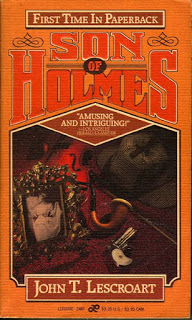 But now for the real-world reason. The Lupa Schwartz series is thinly veiled pastiche of the Nero Wolfe series of mystery novels. And the Nero Wolfe books were a pastiche of the Sherlock Holmes series. The Nero Wolfe books were written by a man named Rex Stout. Nero, as you may realize, is the name of a Roman emperor. In one of the books a character mentions this fact to Wolfe, and he counters that he was not named for an emperor but rather for a mountain. The mountain he was referring to would be Monte Negro, a Balkan mountain which shares its name with a small Balkan country (and former Yugoslavian state.) Wolfe was claiming that his name is a variant of Negro – which means black; making his full name Black Wolfe. (Schwartz, by the way, means black.) Knowing this story, when I was creating the series, I decided that my character’s name would be a variant of black wolf. I also knew that in the series, Wolfe had a daughter named Carla. Carla’s last name was Lovchen, and Lovchen was also the name of a Yugoslavian mountain. Is there a mountain anywhere in the world, I wondered, named for a wolf? As it happens, there is. Mount Lupa is in Antarctica near Romulus Glacier. And it happens that there’s also a previously existing homage to the Nero Wolfe books written by the author John Lescroat. His character, Auguste Lupa, frequently uses aliases pairing a word meaning wolf with the name of a Roman emperor. Remember earlier when I mentioned that Carla chose the name Lupa as it was an alias previously employed by her father, Nero Wolfe? So there you have it. I carefully chose the name Lupa because it’s both the name of a mountain and a wolf; and I can justify the fact that it’s traditionally a feminine name by employing the serendipitous happenstance that the character who I had chosen to make his mother had been given a cross-gender name by the very author who’s series I am paying homage to.
But now for the real-world reason. The Lupa Schwartz series is thinly veiled pastiche of the Nero Wolfe series of mystery novels. And the Nero Wolfe books were a pastiche of the Sherlock Holmes series. The Nero Wolfe books were written by a man named Rex Stout. Nero, as you may realize, is the name of a Roman emperor. In one of the books a character mentions this fact to Wolfe, and he counters that he was not named for an emperor but rather for a mountain. The mountain he was referring to would be Monte Negro, a Balkan mountain which shares its name with a small Balkan country (and former Yugoslavian state.) Wolfe was claiming that his name is a variant of Negro – which means black; making his full name Black Wolfe. (Schwartz, by the way, means black.) Knowing this story, when I was creating the series, I decided that my character’s name would be a variant of black wolf. I also knew that in the series, Wolfe had a daughter named Carla. Carla’s last name was Lovchen, and Lovchen was also the name of a Yugoslavian mountain. Is there a mountain anywhere in the world, I wondered, named for a wolf? As it happens, there is. Mount Lupa is in Antarctica near Romulus Glacier. And it happens that there’s also a previously existing homage to the Nero Wolfe books written by the author John Lescroat. His character, Auguste Lupa, frequently uses aliases pairing a word meaning wolf with the name of a Roman emperor. Remember earlier when I mentioned that Carla chose the name Lupa as it was an alias previously employed by her father, Nero Wolfe? So there you have it. I carefully chose the name Lupa because it’s both the name of a mountain and a wolf; and I can justify the fact that it’s traditionally a feminine name by employing the serendipitous happenstance that the character who I had chosen to make his mother had been given a cross-gender name by the very author who’s series I am paying homage to.
Published on December 11, 2015 22:50
Why Lupa Schwartz seems to have a girl's name
 The titular hero of the Lupa Schwartz mystery series has a strange first name which has caused several people to assume that Lupa is the female character suggested at on the eBook covers. This, I admit, is a reasonable assumption since Lupa, traditionally refers to a she-wolf. Specifically, Lupa is the name given the she-wolf who – according to legend – reared the orphaned twin brothers Romulus and Remus, founders of the city of Rome. But there’s a reason behind this seemingly odd choice of nomenclature. Well, actually there are several reasons. There’s the reason his parents chose this appellation, and there’s the reason I – the author – chose this moniker. To explain why, I have to make you, the reader, familiar with backstory and homage. Here’s the backstory. Lupa Schwartz is the Balkan born son of an ex-CIA operative and his former-freedom-fighter wife who years earlier joined the underground opposition against Yugoslavia’s tyrannical Tito government. His father, Solomon Vladimir Schwartz, and his mother, Carla Schwartz, raised him as a Jew in one of the rare Balkan Jewish enclaves. When her son was born, she named him Lupa after the alias her own father had once used, August Lupa. When Solomon noted that Lupa means she-wolf, Carla countered that her own name is the feminized version of Charles, which literally means “strong man.” And Solomon, for that matter had a middle name meaning “Lady of the Lake.” Gender-bender forenames were – after all – a family tradition.
The titular hero of the Lupa Schwartz mystery series has a strange first name which has caused several people to assume that Lupa is the female character suggested at on the eBook covers. This, I admit, is a reasonable assumption since Lupa, traditionally refers to a she-wolf. Specifically, Lupa is the name given the she-wolf who – according to legend – reared the orphaned twin brothers Romulus and Remus, founders of the city of Rome. But there’s a reason behind this seemingly odd choice of nomenclature. Well, actually there are several reasons. There’s the reason his parents chose this appellation, and there’s the reason I – the author – chose this moniker. To explain why, I have to make you, the reader, familiar with backstory and homage. Here’s the backstory. Lupa Schwartz is the Balkan born son of an ex-CIA operative and his former-freedom-fighter wife who years earlier joined the underground opposition against Yugoslavia’s tyrannical Tito government. His father, Solomon Vladimir Schwartz, and his mother, Carla Schwartz, raised him as a Jew in one of the rare Balkan Jewish enclaves. When her son was born, she named him Lupa after the alias her own father had once used, August Lupa. When Solomon noted that Lupa means she-wolf, Carla countered that her own name is the feminized version of Charles, which literally means “strong man.” And Solomon, for that matter had a middle name meaning “Lady of the Lake.” Gender-bender forenames were – after all – a family tradition.
 But now for the real-world reason. The Lupa Schwartz series is thinly veiled pastiche of the Nero Wolfe series of mystery novels. And the Nero Wolfe books were a pastiche of the Sherlock Holmes series. The Nero Wolfe books were written by a man named Rex Stout. Nero, as you may realize, is the name of a Roman emperor. In one of the books a character mentions this fact to Wolfe, and he counters that he was not named for an emperor but rather for a mountain. The mountain he was referring to would be Monte Negro, a Balkan mountain which shares its name with a small Balkan country (and former Yugoslavian state.) Wolfe was claiming that his name is a variant of Negro – which means black; making his full name Black Wolfe. (Schwartz, by the way, means black.) Knowing this story, when I was creating the series, I decided that my character’s name would be a variant of black wolf. I also knew that in the series, Wolfe had a daughter named Carla. Carla’s last name was Lovchen, and Lovchen was also the name of a Yugoslavian mountain. Is there a mountain anywhere in the world, I wondered, named for a wolf? As it happens, there is. Mount Lupa is in Antarctica near Romulus Glacier. And it happens that there’s also a previously existing homage to the Nero Wolfe books written by the author John Lescroat. His character, Auguste Lupa, frequently uses aliases pairing a word meaning wolf with the name of a Roman emperor. Remember earlier when I mentioned that Carla chose the name Lupa as it was an alias previously employed by her father, Nero Wolfe? So there you have it. I carefully chose the name Lupa because it’s both the name of a mountain and a wolf; and I can justify the fact that it’s traditionally a feminine name by employing the serendipitous happenstance that the character who I had chosen to make his mother had been given a cross-gender name by the very author who’s series I am paying homage to.
But now for the real-world reason. The Lupa Schwartz series is thinly veiled pastiche of the Nero Wolfe series of mystery novels. And the Nero Wolfe books were a pastiche of the Sherlock Holmes series. The Nero Wolfe books were written by a man named Rex Stout. Nero, as you may realize, is the name of a Roman emperor. In one of the books a character mentions this fact to Wolfe, and he counters that he was not named for an emperor but rather for a mountain. The mountain he was referring to would be Monte Negro, a Balkan mountain which shares its name with a small Balkan country (and former Yugoslavian state.) Wolfe was claiming that his name is a variant of Negro – which means black; making his full name Black Wolfe. (Schwartz, by the way, means black.) Knowing this story, when I was creating the series, I decided that my character’s name would be a variant of black wolf. I also knew that in the series, Wolfe had a daughter named Carla. Carla’s last name was Lovchen, and Lovchen was also the name of a Yugoslavian mountain. Is there a mountain anywhere in the world, I wondered, named for a wolf? As it happens, there is. Mount Lupa is in Antarctica near Romulus Glacier. And it happens that there’s also a previously existing homage to the Nero Wolfe books written by the author John Lescroat. His character, Auguste Lupa, frequently uses aliases pairing a word meaning wolf with the name of a Roman emperor. Remember earlier when I mentioned that Carla chose the name Lupa as it was an alias previously employed by her father, Nero Wolfe? So there you have it. I carefully chose the name Lupa because it’s both the name of a mountain and a wolf; and I can justify the fact that it’s traditionally a feminine name by employing the serendipitous happenstance that the character who I had chosen to make his mother had been given a cross-gender name by the very author who’s series I am paying homage to.
Published on December 11, 2015 22:50
November 24, 2015
Guest Post: Self Doubt by Sean Buckley
Sean Buckley only became an author by chance. In 2010 Sean was diagnosed with a particularly aggressive form of psoriatic arthritis. The rapid spread of the and the resulting struggle to combat pain and crippling joint damage led to Sean retiring from business life in 2013.
 After spending almost thirty successful years working with some of the world`s leading brands and retailers in the fashion and outdoor industries, forced retirement came as a total culture shock. Unable to work in what he considered the traditional sense, writing by means of speech recognition software became a means to keeping his mind active. Sean writes from a unique perspective as someone who has lived and breathed in the cosseted world of the senior executive where life was the constant round of first class from one international fashion show to the next. Characters in the books often stay in the same hotels and eat in the restaurants all of which were once part of Sean’s daily life and are described with atmospheric detail. Crime thrillers had always interested him so it was inevitable that this would be his chosen genre. The enduring mystery surrounding the death of the Italian banker Roberto Calvi appealed because of the sheer quantity of conspiracy theories that had evolved around the case. Several false starts later and after devouring information from books, newspapers and television a clear vision of the characters and how they interacted formed in his mind. The books have developed into a platform to explore the complexity of conspiracy theory. References throughout the books to the fleur-de-lis has resulted in it becoming something of a brand logo for Sean. The successful publication of The Calvi Parallax in July 2014 was quickly followed by The Calvi Continuance novellas, Arlo Negri and Alex Bale in 2014. The latest book in the Ereptio Series, Quorum, was published October 30th 2015. Sean has also released a very successful series of Adult Colouring Books after being introduced to the idea of mindfulness as a complimentary treatment to his own condition in early 2014. Currently Sean’s books have sold in thirty-three countries around the world and despite having not been translated have sold extremely well in Austria, Germany, Sweden, Denmark and Norway. Sean is married with one child and still lives in Manchester despite the climate and the effect that it has on his arthritis. A lover of sport in general, Sean is a lifelong fan of Manchester City and religiously attends games along with his family.
After spending almost thirty successful years working with some of the world`s leading brands and retailers in the fashion and outdoor industries, forced retirement came as a total culture shock. Unable to work in what he considered the traditional sense, writing by means of speech recognition software became a means to keeping his mind active. Sean writes from a unique perspective as someone who has lived and breathed in the cosseted world of the senior executive where life was the constant round of first class from one international fashion show to the next. Characters in the books often stay in the same hotels and eat in the restaurants all of which were once part of Sean’s daily life and are described with atmospheric detail. Crime thrillers had always interested him so it was inevitable that this would be his chosen genre. The enduring mystery surrounding the death of the Italian banker Roberto Calvi appealed because of the sheer quantity of conspiracy theories that had evolved around the case. Several false starts later and after devouring information from books, newspapers and television a clear vision of the characters and how they interacted formed in his mind. The books have developed into a platform to explore the complexity of conspiracy theory. References throughout the books to the fleur-de-lis has resulted in it becoming something of a brand logo for Sean. The successful publication of The Calvi Parallax in July 2014 was quickly followed by The Calvi Continuance novellas, Arlo Negri and Alex Bale in 2014. The latest book in the Ereptio Series, Quorum, was published October 30th 2015. Sean has also released a very successful series of Adult Colouring Books after being introduced to the idea of mindfulness as a complimentary treatment to his own condition in early 2014. Currently Sean’s books have sold in thirty-three countries around the world and despite having not been translated have sold extremely well in Austria, Germany, Sweden, Denmark and Norway. Sean is married with one child and still lives in Manchester despite the climate and the effect that it has on his arthritis. A lover of sport in general, Sean is a lifelong fan of Manchester City and religiously attends games along with his family.
Quorum was published on 30 October 2015
Amazon Author Page, Amazon link to the book Quorum, Website link, Link to Mindfulness website - Relaxartation.

 After spending almost thirty successful years working with some of the world`s leading brands and retailers in the fashion and outdoor industries, forced retirement came as a total culture shock. Unable to work in what he considered the traditional sense, writing by means of speech recognition software became a means to keeping his mind active. Sean writes from a unique perspective as someone who has lived and breathed in the cosseted world of the senior executive where life was the constant round of first class from one international fashion show to the next. Characters in the books often stay in the same hotels and eat in the restaurants all of which were once part of Sean’s daily life and are described with atmospheric detail. Crime thrillers had always interested him so it was inevitable that this would be his chosen genre. The enduring mystery surrounding the death of the Italian banker Roberto Calvi appealed because of the sheer quantity of conspiracy theories that had evolved around the case. Several false starts later and after devouring information from books, newspapers and television a clear vision of the characters and how they interacted formed in his mind. The books have developed into a platform to explore the complexity of conspiracy theory. References throughout the books to the fleur-de-lis has resulted in it becoming something of a brand logo for Sean. The successful publication of The Calvi Parallax in July 2014 was quickly followed by The Calvi Continuance novellas, Arlo Negri and Alex Bale in 2014. The latest book in the Ereptio Series, Quorum, was published October 30th 2015. Sean has also released a very successful series of Adult Colouring Books after being introduced to the idea of mindfulness as a complimentary treatment to his own condition in early 2014. Currently Sean’s books have sold in thirty-three countries around the world and despite having not been translated have sold extremely well in Austria, Germany, Sweden, Denmark and Norway. Sean is married with one child and still lives in Manchester despite the climate and the effect that it has on his arthritis. A lover of sport in general, Sean is a lifelong fan of Manchester City and religiously attends games along with his family.
After spending almost thirty successful years working with some of the world`s leading brands and retailers in the fashion and outdoor industries, forced retirement came as a total culture shock. Unable to work in what he considered the traditional sense, writing by means of speech recognition software became a means to keeping his mind active. Sean writes from a unique perspective as someone who has lived and breathed in the cosseted world of the senior executive where life was the constant round of first class from one international fashion show to the next. Characters in the books often stay in the same hotels and eat in the restaurants all of which were once part of Sean’s daily life and are described with atmospheric detail. Crime thrillers had always interested him so it was inevitable that this would be his chosen genre. The enduring mystery surrounding the death of the Italian banker Roberto Calvi appealed because of the sheer quantity of conspiracy theories that had evolved around the case. Several false starts later and after devouring information from books, newspapers and television a clear vision of the characters and how they interacted formed in his mind. The books have developed into a platform to explore the complexity of conspiracy theory. References throughout the books to the fleur-de-lis has resulted in it becoming something of a brand logo for Sean. The successful publication of The Calvi Parallax in July 2014 was quickly followed by The Calvi Continuance novellas, Arlo Negri and Alex Bale in 2014. The latest book in the Ereptio Series, Quorum, was published October 30th 2015. Sean has also released a very successful series of Adult Colouring Books after being introduced to the idea of mindfulness as a complimentary treatment to his own condition in early 2014. Currently Sean’s books have sold in thirty-three countries around the world and despite having not been translated have sold extremely well in Austria, Germany, Sweden, Denmark and Norway. Sean is married with one child and still lives in Manchester despite the climate and the effect that it has on his arthritis. A lover of sport in general, Sean is a lifelong fan of Manchester City and religiously attends games along with his family. QuorumFriday 13thNovember 2015 is a date that will be etched into my mind until the day I die. I, like all rational minded people was shocked and appalled as I watched the events unfold on my television. Unfortunately, that is not totally true. I was not shocked. I was just shocked that what I had written two or three months earlier seemed to be unfolding before my eyes. I was hit by a wave of self-doubt. The book. My new book. The one I had researched, nurtured, written, then re-written time and time again until the words on the page fitted with the pictures in my mind, that book. It was only a story but did I have the right to profit from something that so closely mirrored the events in Paris. It was my baby, over a year`s worth of work and I wanted it out there but the thought that people might think I was trying to profit from the pain of others had me on the verge of pulling the book from sale. Finally, I turned to a community of UK writers and asked them the question. The response from them was unanimous, with no deliberate intent to profit from the atrocities the book should remain published. Hindsight is a wonderful thing. So now not much more than a week later I`m pleased that my book is out there. It poses questions of ethics, morality and jurisdiction of the characters. It is those same questions that our politicians now face. In the book I make reference to a fictional military operation and then on Sunday I read the article by Jimmy McCloskey, published in the Daily Star titled, “SAS hit squad to wipe out ISIS: UK, US and French forces to pick off terror nuts”. I thought this should worry me but it didn`t. It was then that I realised that the people whose advice I had sought were right. The book should remain published. In fact, it is my duty as a responsible citizen and member of society to publish my work. I like many other authors am free from the constraints imposed on journalists by editors, by publishers and media owners. If reality is to mirror fiction, then fiction writers need to write and be read. Extremism in all its forms, political, religious, xenophobic, abhorrent or not, must be explored by those of us not burdened by censorship. I will leave you with a famous quote, one that seems appropriate under the circumstance. It is often attributed to the Eighteenth Century politician and philosopher Edmund Burke but the origin is less important than the message. “All that is necessary for the triumph of evil is that good men do nothing.”

The Arab Spring that offered hope to millions has withered and died as civil war and terror engulf much of the Middle East. Russia has annexed Crimea and continues to support rebels throughout the Ukraine. In Gaza Israeli and Hamas forces continue to fight as the West increases the pressure on Israel to find a permanent resolution to the conflict. The war in Syria has ripped the country apart and a new Jihadist group calling itself Islamic State has emerged to control vast swathes of Syria and Iraq to dispense a barbarism not seen since the Middle Ages. The flow of refugees from the war ravaged areas of Africa and the Middle East increasingly resembles a tsunami of human suffering that threatens the very infrastructure of the EU. As the tentacles of terror touch its borders it seems like only a matter of time before the West is drawn into what could develop into a new World War. When Gianfranco Molinari of the newly formed European Financial Bureau, gets drawn into investigating the seemingly obscure murders of two men in the quiet Danish city of Odense it soon becomes apparent that he is in a race against time where the very existence of Europe as we know it is at stake.
Quorum was published on 30 October 2015
Amazon Author Page, Amazon link to the book Quorum, Website link, Link to Mindfulness website - Relaxartation.

Published on November 24, 2015 09:35
November 23, 2015
Box Set Coming for the Holidays
 At the end of December, I will be releasing my first digital box set. It will contain volumes 2 thru 5 of the Lupa Schwartz series and will be available exclusively on Amazon for the Kindle for three months. The cost will be $9.99 however members of Amazon Prime will be able to download it for no additional cost. Considering that volume ONE is already free on Amazon, this means that Prime members can own the entire series to-date for no additional cost. Basically you can get the entire series for FREE with your Prime membership!
At the end of December, I will be releasing my first digital box set. It will contain volumes 2 thru 5 of the Lupa Schwartz series and will be available exclusively on Amazon for the Kindle for three months. The cost will be $9.99 however members of Amazon Prime will be able to download it for no additional cost. Considering that volume ONE is already free on Amazon, this means that Prime members can own the entire series to-date for no additional cost. Basically you can get the entire series for FREE with your Prime membership!
Published on November 23, 2015 11:49
November 4, 2015
Now Available at the Following Online Locations:
8 Tales of Noir: As Heard on the Thrills and Mystery Podcast
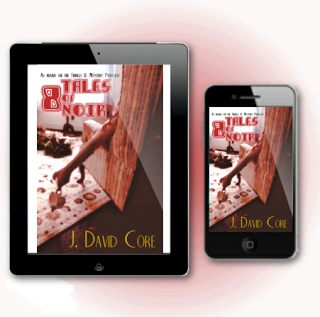 ●iBooks●Scribd
●iBooks●Scribd●Kobo●Smashwords●CreateSpace●Goodreads●Tomely●Amazon for Kindle●Amazon Paperback●Barnes & Noble for Nook●iBook Store Paperback
More locations coming soon!
8 tales of Noir is just what the title would lead you to expect, eight stories about the darker side of the human condition. Six short stories lead in to two novella length tales.
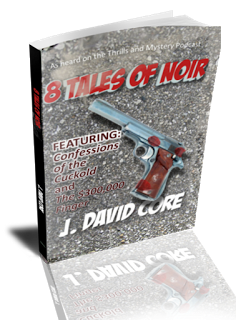
· Two desperate men at a standoff on a residential inner-city street...· A high school prank with unexpected - and deadly - results...· When you grab the wife of a small-time construction company owner for ransom, make sure he's not from the family...or smarter than you...· A man intent on collecting a debt…· A heist gone wrong…· A prodigal son whose sins follow him home...· A moment of reckless anger puts a sad-sack on the wrong side of the law and leads to an unexpected comradeship with the forlorn bounty hunter sent to bring him in.· Finally, a high school dean, a construction worker, and an off-duty cop head out for a night on the prowl. When each agrees to seek out and introduce another of the trio to his ideal woman, only the annoying fly that keeps buzzing the table is privy to all the behind-the-scenes goings on in this quirky black comedy.
Listen to an excerpt here.
Published on November 04, 2015 09:58
October 20, 2015
Author Interview: Andrew Man, Author of Beyond the Rest of Us
Andrew Man was born in Exeter, Devon, in April 1946.
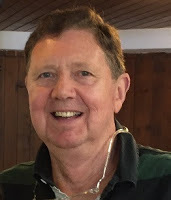 After the War, Andrew’s parents moved the family to Nottingham, England. Andrew’s education was completed at a school in the Midlands and he followed another old school boy D.H. Lawrence, in his quest for the purpose of life? Having shown little interest at school, he was sent to a School of Navigation and then apprenticed to the ‘Port out - Starboard home’ Steam Navigation Company. He served on some very old cargo vessels and some yellow funnel dream boats during the 60’s and 70’s. Then becoming disillusioned and bored he went back to study for a new career in finance. His career in finance was to last nearly thirty years, working with British, American and Swiss Banks and finally with his own finance company in downtown Beirut.
After the War, Andrew’s parents moved the family to Nottingham, England. Andrew’s education was completed at a school in the Midlands and he followed another old school boy D.H. Lawrence, in his quest for the purpose of life? Having shown little interest at school, he was sent to a School of Navigation and then apprenticed to the ‘Port out - Starboard home’ Steam Navigation Company. He served on some very old cargo vessels and some yellow funnel dream boats during the 60’s and 70’s. Then becoming disillusioned and bored he went back to study for a new career in finance. His career in finance was to last nearly thirty years, working with British, American and Swiss Banks and finally with his own finance company in downtown Beirut.His writing developed after he retired through visits to the CERN science centre in Switzerland, which also forms a basis for some of his stories. To write his books, he has moved through places where he worked in the past, from London, Lebanon, to Geneva and the Caribbean.
Andrew lives in the Swiss Romande part of Switzerland with his wife and a teenage son and if you stand on a chair in the garden you may see the Mont Blanc.
Beyond the Rest of Us, a Time-travelling conspiracy thriller by Andrew Man
A retired Swiss banker is kidnapped at a Geneva hotel for crimes he doesn’t understand. An Italian cruise ship crashes into rocks in the Tyrrhenian Sea. A respected American scientist disappears into thin air. And a British secret agent follows a trail of corrupt power in this gripping third book featuring Andrew Man’s aging male protagonist James Pollack.
Who are your influences?My writing influence sits between two very different authors: the English author John Fowles, and the American, John Updike. I know it’s a struggle to place both of these greats in the same camp, but I dream of mixing similar styles and coming up with something equally special. I love the language Fowles uses, and his intricately woven plot lines, the evolution of literature to allow the story to unfold. Then I am gripped by Updike’s ability to bring us closer to the sensations of being alive. A further influence I also consider when writing is John Le Carré and his famous spy novels. I enjoy his use of mood, and the way he builds tension, when searching for a way to enhance a scene.
Thinking towards the field of unorthodox science, I am also a great admirer of Graham Hancock. I find his ability to challenge the accepted scientific norms and find better solutions, to be most refreshing. And … he’s been doing it for over thirty years.
When did you begin writing? As a young man in the navy I loved reading. As soon as I joined a new ship, I would start acquiring all the adventure books on board, often about the places we were to visit with books like Conrad’s ‘Lord Jim’. It was also a time when I read most of the great English classics spending a lot of time outside foreign ports, swinging around the anchor chain. I never actually wrote anything at that time, except letters to my parents and friends back home, some of which I have kept. Life in the 60’s was quite different and as young cadets we were only allowed ashore with an officer to swim at the Indian Mission Clubs, but that all changed when we became officers with a certificate of navigation and a new life on passenger ships. My move into the world of banking and finance was only after a degree course and post grad studies at the University of Plymouth. International banking was entering new sectors of the economy which required copious capital for some of the biggest post war industries, such as North Sea Oil. I never really attempted to start writing about my past maritime experiences, but the memories lived on. One day I knew I would write these stories, but the time was just not right then.
Some five years ago I had a major heart operation and found I needed a more relaxed lifestyle. I retired a year early and began to think about writing a book. My first full length novel was born, almost as an auto-biography.
How do you come up with your stories, characters, character names etc.?
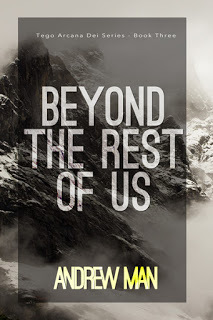 I look to find real-life places and events from the past that reflect deep insights and personal experience. More important I often do months of research about a situation, or a place out of the ordinary. Background reading takes up a lot of time at this stage, even if you want to write fiction you must be as correct as possible with the details. Once you are confident with the scene you have to decide which characters it will involve. Since I travelled a lot with my work in the past I had a wide range of location choices. The first book, Keeping God’s Secret, covered events from the early period of my life from the 60’s to the new millennium. The second book Forces of Retribution continued the story with the same characters up to around 2010. With Beyond the rest of Us, I had been investigating my own family tree and found that our maternal DNA came from a group of people who must have walked from a region south of the Alps, to the S.W of England over 15,000 years ago. This sounded most unlikely. However when I read reports about the climate change of the younger Dryas period (12,000 years ago), it drove an interest in the end of the last ice age. With astral travel, there was also the possibility of writing about different dimensions in time. When you add to that the rumour of intrigue about sinking cruise ships and disappearing aircraft, you have the basis for a new book.The scenes I write often come from ideas seeded during my working days in the past which have included a suicide, bomb blasts and storms, although some events have their roots in real news events from the more recent past. As my writing developed, I found it needed a present day, dynamic antagonist to support the final book of the series. By 2014 the disunited union of Europe, appeared to be a likely candidate for that role.
I look to find real-life places and events from the past that reflect deep insights and personal experience. More important I often do months of research about a situation, or a place out of the ordinary. Background reading takes up a lot of time at this stage, even if you want to write fiction you must be as correct as possible with the details. Once you are confident with the scene you have to decide which characters it will involve. Since I travelled a lot with my work in the past I had a wide range of location choices. The first book, Keeping God’s Secret, covered events from the early period of my life from the 60’s to the new millennium. The second book Forces of Retribution continued the story with the same characters up to around 2010. With Beyond the rest of Us, I had been investigating my own family tree and found that our maternal DNA came from a group of people who must have walked from a region south of the Alps, to the S.W of England over 15,000 years ago. This sounded most unlikely. However when I read reports about the climate change of the younger Dryas period (12,000 years ago), it drove an interest in the end of the last ice age. With astral travel, there was also the possibility of writing about different dimensions in time. When you add to that the rumour of intrigue about sinking cruise ships and disappearing aircraft, you have the basis for a new book.The scenes I write often come from ideas seeded during my working days in the past which have included a suicide, bomb blasts and storms, although some events have their roots in real news events from the more recent past. As my writing developed, I found it needed a present day, dynamic antagonist to support the final book of the series. By 2014 the disunited union of Europe, appeared to be a likely candidate for that role.After the first book I wanted to keep a damaged male hero and a group of strong female characters for the second book. Then with too many female characters, I decided to split them into two groups, one here in our time and the other in another dimension, 50 years in the future! Names are important for each character, and some names need to have ancient meanings. The unlikely name of the hero James Pollack is the same as one of the US founding fathers, who sourced the words ‘In God we trust’ on every dollar bill. Living in Europe helps, as you can checkout first names and common surnames in the region and then play around with various combinations that meet the character. The antagonist Elizabeth Kilmister immediately jumped out at me, as a British secret agent.
Do you work from an outline?I always work from an intro as a timeline and have a few ideas of the early chapters, but then let the story find its head in its own direction. This is known as writing ‘by the seat of your pants’, while other writers are called ‘planners’. I hear of authors who plan their story with cards for each chapter and lay them out for weeks on end, trying to decide if chapter one should follow chapters 3 or 4. It all sounds a bit daft to me, but I probably do a bit of both. There are also graphs of how the story should rise at the beginning, fall in the middle and rise again to a climax at the end. Maybe that’s what Shakespeare did, but he didn’t need a graph, he wrote from his heart.
Keeping the initial premise in mind, I never devise the ending, mainly because I haven’t written the middle part needed to drive the story. The plot plan at this stage ends up as little more than a word count spreadsheet, as I’m not an author who writes 500 pages when it can be said in two hundred. I do move scenes around, often at the beginning. In my last book, I teased the readers in the first four chapters and only started to explain the real plot in chapter five. After that, they either say this book is interesting and different or give up reading the novel. As I'm writing, I feel that I may need to introduce a new character in the direction I need, which is not easy as the story develops, particularly if you have a lot of characters.
Tell me about your favorite scene in your novel.With the theme of the title, it may come as no surprise that my favourite scene involves the Italian cruise ship crashing into rocks. This is where the ‘Concordia’ ship takes an expected hit on an island in the Tyrrhenian Sea. I loved helping Janet with her interest to save the ship in the future, as the story occurs in dream. Janet has a deep emotional attachment to James who is undergoing surgery at a hospital at the same time. Yet, in this scene she is forced to pull out her hidden knowledge, in order to save the crew trapped in a flooded compartment. The scene peaks as James thinks that this may not have been an accident, thinking as an evil banker. For me, the scene evokes a sense of triumph: not only Janet’s triumph over the impending collision, but also her triumph over the greater political threat in Europe. In a way, it hints at the courage Janet is required to draw on to survive the upcoming challenges.
Can you tell us a little about your writing philosophy?I set out to write a series which would be more than a good story. Oddly, I’m greatly motivated by unorthodox science. It started with writers like Graham Hancock thirty years ago and then when I started writing realised that a lot of science and our ancient origins are hidden by the close control of main-stream science. The philosophy of my writing is to shine a light on some of these more enlightened ideas today. I like to think of readers immersing themselves in a story that takes them on a journey away from their real life surroundings. I write to question what I think is missing in main stream media. Having spent so much time researching scientific ideas, I find it refreshing to allow my mind to run free.
Have you ever tried writing in any other genres?Not really, I did manage to complete a short pilot script which took the lead character through a series of time travel events. It was actually a combination of the second book I had written spanning different dimensions, and across different countries. The style was, in a way, based on my second novel. My intention was more to learn what worked in the film industry and what didn’t, pitching it to film execs in Hollywood. I still believe, this, could be a success, but they needed the final book to the series. I may look at adapting that story one day and putting it out as a TV script.
Beyond the Rest of Us is available at Amazon, Barnes& Noble, and wherever good books are sold.
Published on October 20, 2015 13:53
October 8, 2015
8 Tales of Noir Release Announcement
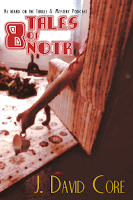 November 2 is the date I will be releasing my noir anthology, 8 Tales of Noir. Two of the stories are novella length and have been previously released as stand-alone ebooks, but this is the first time one of the stories will also be available in paperback format. The other six stories were all featured as episodes in my podcast, which is available at thrillsandmystery.com.
November 2 is the date I will be releasing my noir anthology, 8 Tales of Noir. Two of the stories are novella length and have been previously released as stand-alone ebooks, but this is the first time one of the stories will also be available in paperback format. The other six stories were all featured as episodes in my podcast, which is available at thrillsandmystery.com.This also marks the debut of the ebook cover. I've posted the paperback cover before, but the new ebook cover features an entirely original photo shot in my living room and featuring my daughter's arm as the corpse.
Published on October 08, 2015 10:52



